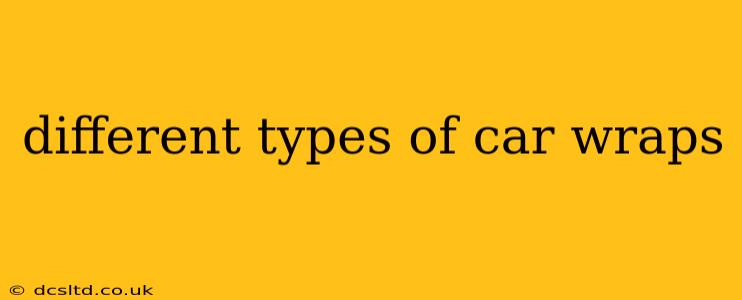Choosing the right car wrap can transform your vehicle's look, protect its paint, and even boost its resale value. But with so many options available, knowing the differences between various types of car wraps can be overwhelming. This guide explores the diverse world of car wraps, helping you make an informed decision for your automotive aesthetic upgrade.
What are the Different Types of Car Wrap Vinyl?
The core of any car wrap is the vinyl material itself. Different types of vinyl offer varying levels of durability, flexibility, and visual effects. Here are some of the most common:
1. Calendared Vinyl: The Budget-Friendly Choice
Calendared vinyl is the most economical option. It's a thinner material, making it easier to apply, but it's also less durable and prone to wrinkles or tears if not installed perfectly. While suitable for shorter-term projects or budget-conscious individuals, its longevity is limited. It's not recommended for vehicles frequently exposed to harsh weather conditions.
2. Cast Vinyl: The Premium Performer
Cast vinyl is the industry standard for professional car wraps. This thicker, more flexible material conforms to complex curves and vehicle contours seamlessly. Its resilience makes it ideal for long-term use, withstanding harsh weather, UV exposure, and even minor impacts. It's the preferred choice for high-quality, long-lasting wraps.
3. Matte Vinyl: A Subtle, Sophisticated Finish
Matte vinyl provides a non-reflective, subdued finish, giving your vehicle a sleek, sophisticated look. It hides imperfections better than gloss finishes and offers a modern, understated aesthetic. Both calendared and cast vinyl are available in matte options.
4. Gloss Vinyl: The Classic, High-Shine Appeal
Gloss vinyl provides a high-shine, reflective finish, enhancing the vehicle's color and adding a luxurious touch. The glossy surface attracts attention and showcases the wrap's design. Again, this finish is available in both calendared and cast vinyl variations.
5. Satin Vinyl: The Perfect Balance
Satin vinyl offers a happy medium between matte and gloss finishes. It presents a subtle sheen without the intense reflection of gloss, creating a more understated yet elegant look. This option combines the best of both worlds, delivering a balanced visual appeal.
6. Chrome Vinyl: A Bold, Eye-Catching Statement
Chrome vinyl creates a striking, mirror-like effect. It's extremely eye-catching and adds a futuristic, high-end appearance. However, it's more challenging to install correctly, requiring a high level of expertise. Minor imperfections are highly visible on this type of wrap.
7. Carbon Fiber Vinyl: The Sporty, Aggressive Look
Carbon fiber vinyl imitates the look and texture of real carbon fiber, providing a sporty and aggressive aesthetic. It’s a popular choice for car enthusiasts looking to enhance their vehicle's performance image.
What are the Different Types of Car Wrap Finishes?
Beyond the vinyl type, car wrap finishes add another layer of customization:
8. Perforated Vinyl: See-Through Functionality
Perforated vinyl is a special type of vinyl with small holes allowing visibility through the wrap. It's often used for window wraps, allowing drivers to see out while maintaining a branded or decorative look.
9. 3M Scotchprint™ Wrap Film Series: An Industry Leader
While not a specific type of vinyl, the 3M Scotchprint™ series represents a range of high-quality cast films known for their durability, color consistency, and ease of application. They often represent a benchmark for quality in the car wrap industry.
H2: What is the difference between a full wrap and a partial wrap?
A full wrap covers the entire vehicle, transforming its appearance completely. A partial wrap, on the other hand, covers only specific sections, such as the hood, roof, or side panels. Partial wraps offer a more subtle modification and are often less expensive than full wraps.
H2: How long do car wraps last?
The lifespan of a car wrap depends on several factors, including the type of vinyl used, the quality of installation, and the vehicle's exposure to the elements. Generally, high-quality cast vinyl wraps can last 3-5 years, sometimes even longer with proper care.
H2: How much does a car wrap cost?
The cost of a car wrap varies significantly depending on the size and type of vehicle, the type of vinyl used, the complexity of the design, and the installer's experience. Expect to pay anywhere from a few hundred to several thousand dollars.
H2: Are there any downsides to car wraps?
While car wraps offer many benefits, there are some potential downsides. Poorly installed wraps can wrinkle or bubble, and removing them can sometimes damage the underlying paint. It's crucial to choose a reputable installer to minimize these risks.
By understanding the different types of car wraps and their characteristics, you can make an informed decision to best suit your needs and budget. Remember, investing in quality materials and professional installation is key to achieving a long-lasting, visually stunning result.
